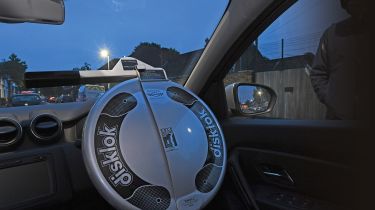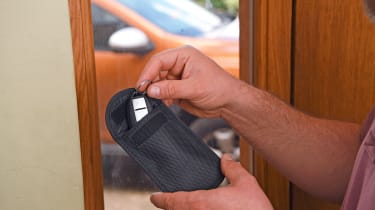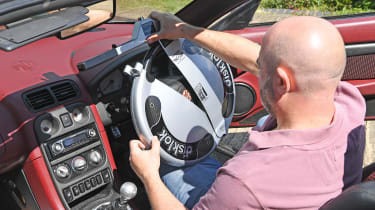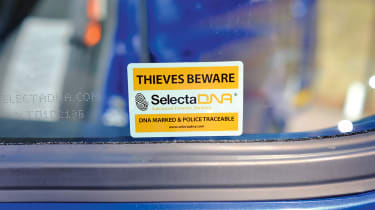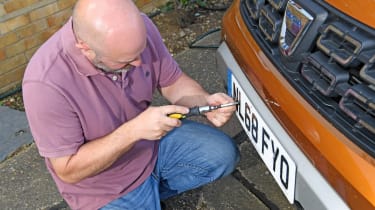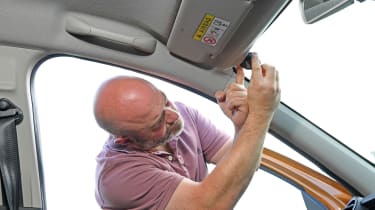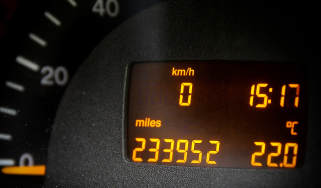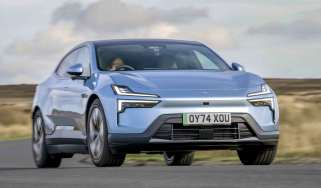Car security: products, devices and tips to keep your car safe
From simple to hi-tech, we look at some of the best ways to help stop your car or its contents being stolen
Factory-fitted car alarms and immobilisers aren’t always a deterrent for would-be car thieves as many can easily be bypassed by the sophisticated tech criminals have at their disposal. Thankfully, there are plenty of aftermarket car security devices which can help increase your car’s security and deter thieves, as well as basic precautions you can take yourself. Below, we look at the different types of car security kit for almost every budget.
Unlike car criminals of the past, the modern car crook isn’t necessarily armed with just a crowbar and a screwdriver. Their ambitions go beyond looking for items to steal from a parked car or going on joyrides. Our cars are more capable than ever before, so many car thieves will invest hundreds of pounds in car theft tech to bypass modern security systems. Once stolen, many cars will be given a false identity, smuggled abroad, broken up for parts or used in other crimes.
Thankfully, there are various aftermarket car security devices which can help protect your pride and joy from criminals. From cheap Faraday bag key pouches and steering wheel locks, to top-of-the-range driveway bollards, we run through the best security devices money can buy to keep your car safe on this page. Scroll down and we’ll also give you some top tips on how to keep your car safe.
How common is car theft in the UK?
Despite modern cars being fitted with sophisticated alarms and immobilisers, car crime is still a problem for motorists, with little in the way of repercussions for thieves.
According to the Office for National Statistics (ONS), a total of 129,159 vehicles were stolen in the UK between April 2023 and March 2024. An average of over 350 cars per day.
The ONS’ Crime Survey for England and Wales data also highlights the increase in keyless vehicle thefts. Between March 2023 and 2024, 58 per cent of car thefts were committed by criminals who illegally accessed cars by replicating and/or manipulating the signals emitted from the vehicle’s keyfob. Only 19 per cent of vehicles were stolen this way in 2019.
Types of car security devices
So, how can you make life more difficult for these increasingly-sophisticated criminals? We’ve taken a look at some of the latest gadgets, and a few old favourites, to help keep your car safe and potentially bring down the cost of insurance.
Car key Faraday pouches and signal blockers
Many modern models are ‘keyless’, which means you don’t have to take the key out of your pocket to unlock or even start the car. While that’s great for convenience, it’s not so good for security, increasing the likelihood you could fall victim to keyless car theft.
Thieves use boosters to amplify the key’s signal enough to open and start the car, no matter where you keep your car keys in the house. You can prevent keyless car theft by using a signal-blocking Faraday bag. We’d recommend the £6 Defender Pouch, which came out on top in our Faraday pouch and car key signal blocker test, but similar items are also available.
We recommend you keep keys (including spares) in a safe, too, to protect your car in the event of a burglary. They start from less than £40.
Steering wheel locks
Steering wheel locks have been around for decades but are some of the most simple, yet effective ways of deterring car thieves.
Some steering wheel locks come in the form of a simple metal bar with a locking mechanism, while others like a Disklok cover the entire wheel completely. Whichever steering wheel lock you choose should deter all but the most committed car criminal by making it impossible to drive off without removing the lock.
Steering wheel locks can also prevent airbag or steering wheel theft, which is an increasing problem as crooks look for cheap parts to repair crash-damaged cars. Starting from around £50 for a capable steering wheel lock, they are quite expensive and can be a tad cumbersome to fit. The upside is that they can be used on nearly everything from classic cars to motorhomes.
The Stoplock Pro Elite is one of our favourite steering wheel locks currently on the market as it offers a great balance of security for a reasonable price. You can see how it performs against other wheel lock rivals in our steering wheel lock product test.
Wheel clamps
Alongside steering wheel locks, wheel clamps are a great visual deterrent for car thieves. Wheel clamps can be fitted to wheels of almost any size, are made of extremely strong steel and have pick-proof locks. Good wheel clamps are very difficult for car criminals to remove, even when equipped with power cutting tools.
OBD port locks
All modern cars have an OBD (on-board diagnostic) port, a universal plug technicians use to access the vehicle’s electronic brain.
Unfortunately, this port can also be used by crooks to bypass the immobiliser, and even reprogram a blank key so that it unlocks and starts the car. You can protect an OBD port with a special lock, costing around £200, depending on the model and its abilities.
Car window laminations and etching
While some thieves are using clever technology to break into cars, the cruder criminal will still use the smash-and-grab method to get into a vehicle and take whatever they want.
One way to stop or slow them down is to install glass lamination on the side and rear windows. This plastic sheeting is invisible but helps strengthen and hold the panes together, like a laminated windscreen. Professionally-installed film on a mid-sized family car, like a Nissan Qashqai, would cost in the region of £500.
If window laminations are a little out of your price range, etching the car’s registration number onto the glass or certain parts can also act as a deterrent. Window etching can cost as little as £20, with car parts stores like Halfords providing this service. You could combine this with DNA marking, which is even more sophisticated.
DNA marking involves dabbing a uniquely-coded paint on 50 points on your car. It dries clear, but can be seen under ultraviolet lights. Security-marking kits, such as SelectaDNA, cost around £60, but some police forces offer it for free. Some car insurance providers will give a discount for marked cars.
Car number plate security screws
Car thieves aren’t always after your car or the possessions you might have inside. Some thieves will just want to steal or clone your vehicle’s identity.
Having your number plates stolen doesn’t just mean you’ll have to pay to replace them. Thieves can use false plates to clone your car (or disguise a stolen model’s identity) and then use the vehicle to commit other crimes.
If you’re a victim of number plate theft you could face lots of stressful paperwork as you clear your name. Since most plates are fixed in place by either sticky pads or regular screws, any thief can remove them in seconds. You can make it more difficult for criminals to steal your number plate by fitting tamper-proof security screws which are available for as little as £5.00.
Driveway CCTV and security lights
Thieves tend to be camera-shy, so CCTV cameras can be a good deterrent. CCTV cameras can also help police to identify and catch crooks. Make sure any system has infrared night vision, and go for the best resolution you can afford to make sure faces and registration numbers are identifiable.
If you park your car in an unlit area, you could also go one step further and install a motion detecting security light at the same time. Basic wired systems with just one camera are available from online retailers for less than £100, and tend to be easy to fit. Sophisticated WiFi set-ups, can be expanded to use wireless cameras with floodlights for under £400.
If you're unable to install a CCTV camera or security light, you could invest in a dash cam. Some dash cam models have a 'sentry' mode and will be able to detect motion around the vehicle while it is parked, sending a notification to your phone to warn you if movement is detected.
Driveway bollards
Even if a thief has used a computer to bypass the car’s electronics, they won’t be able to get it off the driveway, or out of a parking space, if it’s blocked in by bollards or solid metal posts.
Physical barriers such as this vary in their sophistication, with remote-control bollards which rise out of the ground automatically costing around £2,000, while a simple key-operated post can be purchased from around £25.
Just remember to keep the key outside the car, and don’t forget the post is there and drive into it yourself.
GPS Trackers
If your car has been stolen, the chances of it being recovered are low, unless you have a GPS tracker.
GPS trackers are fitted discreetly inside the car and can range from basic location trackers from as little as £45 for ones which you can install yourself, to more sophisticated and professionally-fitted systems with the latest technology costing well over £700. Some providers will also charge an annual subscription fee for additional services.
Many types of GPS trackers are approved by insurers and the police. Not only can a tracker help the police recover your car quicker in the event of it being stolen, but car insurance providers may insist on a GPS tracker being fitted to certain cars, or will give a meaningful discount for a properly-fitted device.
Top tips for preventing car theft
Increasing your car’s security through the use of a GPS tracker, steering wheel locks or Faraday key pouch is one way of combatting car theft, but there are other preventative measures you can take to reduce the risk of your car being stolen.
Lock your car
When leaving your car unattended, make sure you keep your car locked, ensuring the windows and sunroof are closed too. It sounds obvious but you’d be surprised how often cars are left unlocked.
The wing mirrors on many modern cars fold-in automatically when the car is locked. Car thieves are now targeting cars with the wing mirrors still out, trying the door handles as it could be a sign that the vehicle is unlocked.
Keep valuables out of sight
Don’t leave handbags, rucksacks or valuable items on display in the footwells or on the passenger and rear seats. Always take them out of the car if possible, or hide them away in the boot.
Keep the keys safe
Keep the car keys safe in your house and not left in sight near doors or windows.
Cars with keyless ignitions are especially vulnerable from key cloning and ‘relay theft’. This is where thieves use a device which can fool the car into thinking the key is close by, making it possible to unlock and start the car. Keeping your car keys in a Faraday pouch or box can reduce the risk of this happening.
Park responsibly and in well-lit areas
Avoid parking your car in dark or secluded areas. Car thieves are less likely to attempt to steal a car in busier areas or places which are well-lit and covered by CCTV.
Be aware of car jackers
Just because you are in your car doesn’t mean someone won’t try to steal it. You can counter this by driving with the doors locked and remaining vigilant.
Check out our tips and advice section for our latest guides on how to help keep your car safe...
Find a car with the experts

